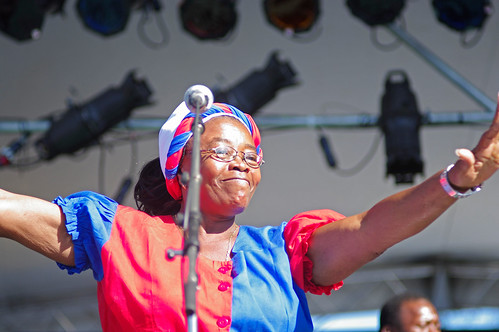Umalali @ Kola Note

By Stefan Opryshko - Pan African Hour - 07/15/2009
Entering Kola Note to see Umalali as part of the Festival International Nuits D’Afrique (running from July 14th to 26th), I didn’t know quite what to expect. I was familiar with their 2008 album and I was familiar with Garifuna music in general (I’d seen the late ambassador of Garifuna music/culture Andy Palacio a number of times), but I was curious to see how the album (a lushly-produced, 5-years-in-the-making, multi-instrumented affair) would translate to a live show. I wasn’t disappointed. Well, there weren’t any horns, so I guess I was a little disappointed, but no big deal…
Joining the predominantly caucasian, upper-middle class, upper-middle age, neo-hippie world music crowd at one of Kola Note’s tables, I was a little choked at being forced to sit. But I decided to do as the natives do and pretended to mull over my stock portfolio and sit tight for the show. With no opening act, I didn’t have to wait long. Mr. Nuits D’Afrique came out and said his (thankfully) brief 'blabbity blah' before turning the stage over to the Garifuna group. Umalali (which means ‘voice’ in the Garifuna language) is essentially a showcase for the role women play in Garifuna music and culture. Garifuna, for those not in the know, is a cultural group of Central America, the descendants of shipwrecked African slaves and Carib and Arawak Indians who live predominantly on the Caribbean coasts of Belize, Guatemala, Honduras and Nicaragua.
Entering the room far left of the stage, our attention was instantly caught by the powerful, soulful voices of the three women representing the Umalali project (the album contains songs by twelve women). Walking across the room, singing unmic-ed and a cappella, I was immediately entranced by the women, representing three generations and three countries of Garifuna culture. Sofia Blanco, from Guatemala, was obviously in charge. In her late 50s, her commanding, wailing voice rose above the rest while her stage persona was wholly captivating. Marcela ‘Chela’ Torres of Honduras, the most soft-spoken of the three, hers was nonetheless the leading voice on many of the evenings songs. The trio was rounded out by Desere Diego of Belize. In her late 20s, she represents a younger generation of Garifuna culture and is one of very few Garifuna women to make her living solely through music. She did have an unfair advantage over the other two (she was the only one who spoke English) but the whole night she shared a special rapport with the audience, leading dances, grabbing members of the crowd, leading sing-alongs (even when her mic cut out) and basically getting everyone all shook up.
The women were joined on stage by two hand-drummers who seemed to be having more fun than anyone else around them, a possibly stoned bass player (but what bassist worth his salt isn’t?), a bluesy, reverb-tastic lead guitar player, and a second rhythm guitar/backup singer/frontman who really loved his grandfather (more on that later). The guys were a great band, keeping the groove going, translating the near-orchestration of the album to a more raw, stripped-down live show while allowing the three women to really shine, which they did. Song after song, the infectious, heart-felt vocal melodies kept the audience’s attention rapt, while their frequent dance breaks and stage antics (like Sofia Blanco mime-fishing) kept it fresh. Amazing, basically, the women could have kept us interested long after the second set was over.
It wasn’t all tea and oranges however. Despite it being all about the women (who were amazing, did I mention that?), the boys felt the need to take over for a while. Maybe the ladies needed a break, but it definitely left a bit to be desired. Not that they were bad, but they lacked the charisma of the women and their interlude would not have been missed. But in case you DID miss it, they decided to play one song twice! Okay, it was composed by the lead man’s grandfather, and I’m sure it’s real significant, but twice? I actually think gramps ripped off the Friends theme for the guitar lick, so it definitely could have been skipped. Oh well, the ladies took over again and despite this minor lull, all was basically wonderful. The group was energetic, the rhythms were funky, the groove was heavy, the melodies were beautiful, the women were amazing (just thought I’d say it one more time) and the encore was "Merua"! Okay, they had already played that one too, but it’s everyone’s favorite, so why not? Basically very nice and good. 4.5 faux-dashiki-wearing, pony-tail-sporting world music fans out of 5.
You can catch Stefan as part of the Pan African Hour, airing on Wednesdays from 12 pm to 1 pm.





